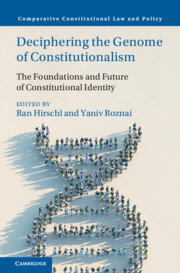Book contents
- Deciphering the Genome of Constitutionalism
- Comparative Constitutional Law and Policy
- Deciphering the Genome of Constitutionalism
- Copyright page
- Contents
- Figures
- Contributors
- Preface
- Acknowledgments
- Introduction
- Part I Foundations, Theory, and Concepts
- Part II Comparative Perspectives
- Part III American Constitutionalism and Constitutional Identity
- Part IV Emerging Trends
- 19 Constitution Making and Disharmonic Identity
- 20 Constitutional Identity and Unamendability
- 21 Illiberal Constitutionalism and the Abuse of Constitutional Identity
- 22 Deconstructing Constitutional Identity in Light of the Turn to Populism
- 23 Unconstitutional Constitutional Identities in The European Union
- 24 What Counts as Constitutional Identity?
- 25 Contrariness and Contradiction in Constitutional Law
- 26 Conclusion
- Index
- References
21 - Illiberal Constitutionalism and the Abuse of Constitutional Identity
from Part IV - Emerging Trends
Published online by Cambridge University Press: 14 March 2024
- Deciphering the Genome of Constitutionalism
- Comparative Constitutional Law and Policy
- Deciphering the Genome of Constitutionalism
- Copyright page
- Contents
- Figures
- Contributors
- Preface
- Acknowledgments
- Introduction
- Part I Foundations, Theory, and Concepts
- Part II Comparative Perspectives
- Part III American Constitutionalism and Constitutional Identity
- Part IV Emerging Trends
- 19 Constitution Making and Disharmonic Identity
- 20 Constitutional Identity and Unamendability
- 21 Illiberal Constitutionalism and the Abuse of Constitutional Identity
- 22 Deconstructing Constitutional Identity in Light of the Turn to Populism
- 23 Unconstitutional Constitutional Identities in The European Union
- 24 What Counts as Constitutional Identity?
- 25 Contrariness and Contradiction in Constitutional Law
- 26 Conclusion
- Index
- References
Summary
Increasingly, illiberal and authoritarian governments are seizing upon the concept of constitutional identity in order to justify and vindicate their political projects in the face of external criticism. This contribution raises questions about what these invocations tell us about the normative value of constitutional identity. The authors argue that, in the European context of supranational legal integration, constitutional identity should not be seen as an unconditional source of value. Invocations of constitutional identity only deserve recognition to the extent that they serve the ideals of constitutionalism. Where constitutional identity is invoked as a normative argument, the normative expectation of constitutionalism is implied – claims from constitutional identity that stand at odds with the ideals of constitutionalism, in fact, invoke the former ironically and frivolously. Exemplary cases in which constitutional identity is invoked to justify forms of ‘illiberal’ constitutionalism – notably the Polish and Hungarian cases – should be considered abuses of the concept as they do not live up to the normative expectations which they evoke.
Keywords
- Type
- Chapter
- Information
- Deciphering the Genome of ConstitutionalismThe Foundations and Future of Constitutional Identity, pp. 272 - 285Publisher: Cambridge University PressPrint publication year: 2024
References
- 1
- Cited by

